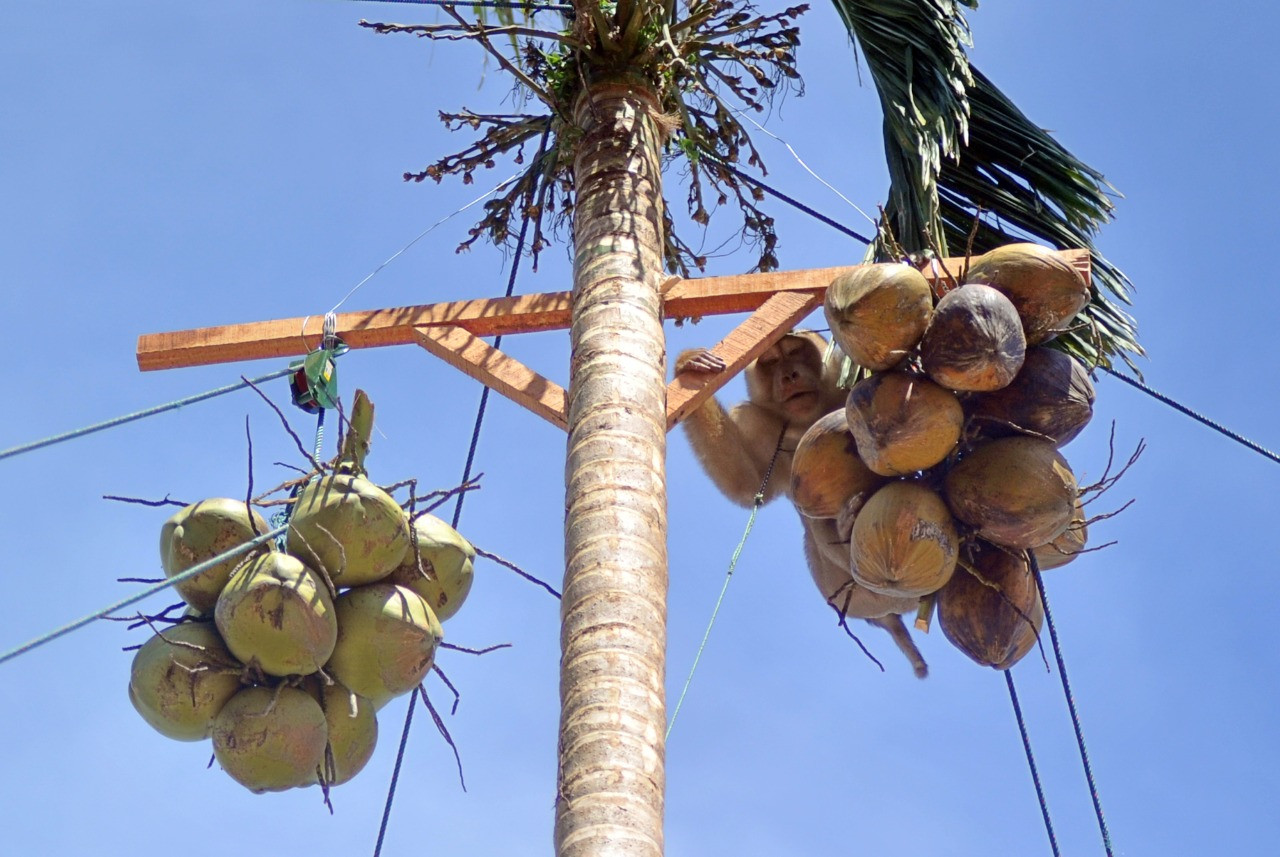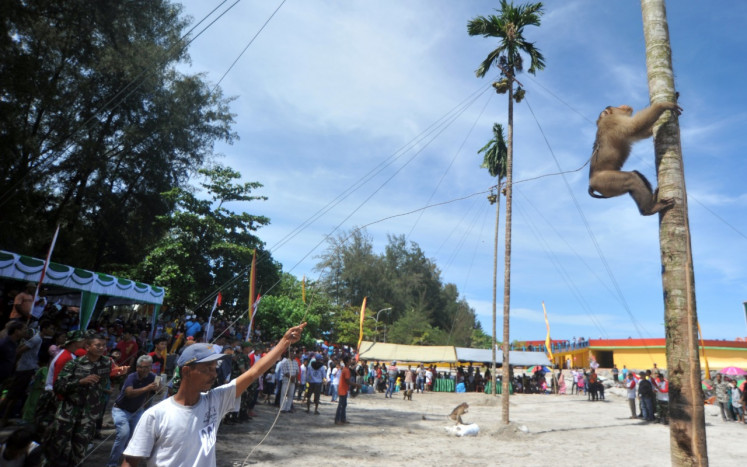Popular Reads
Top Results
Can't find what you're looking for?
View all search resultsPopular Reads
Top Results
Can't find what you're looking for?
View all search resultsFruitful friendship: Skillful macaques and their masters who train them to collect coconuts
During training, macaque leaders usually glaze coconut branches with brown sugar so the primates would immediately aim for that part of the tree. Macaque leaders also regularly communicate with their macaques using sign language.
Change text size
Gift Premium Articles
to Anyone
Desriadi, a 37-year-old resident of East Koto district, Padang Pariaman regency, West Sumatra, had just finished mixing egg yolks with honey in his front porch last week. The odd dish was meant for Lepai, one of the southern pig-tailed macaques he has adopted.
Twice a week, Desriadi conducts his ritual of making the meal for his pet macaque. Additionally, he also makes sure that he gives all five macaques a proper bath every Tuesday and Friday evening.
However, things were slightly off-schedule around Desriadi’s household recently. Instead of feeding Lepai twice a week as usual, Desriadi gave the macaque its favorite yolk-and-honey treat four times.
He said that he gave extra food to Lepai so the macaque could replenish its stamina ahead of the fruit-picking competition held at the Pesona Gandoriah Festival, an official event organized by the Padang Pariaman administration.
It was Lepai’s first fruit-picking competition. Lepai and the other four macaques usually spend their days picking coconuts as an actual job, with Desriadi acting as tukang areh beruak (macaque leader).
Desriadi said his macaques could pick 2,500 coconuts per day. He said Lepai was by far the most productive of his troop as it could pick as many as 1,500 coconuts on its own.
He bought Lepai two years ago for Rp 1.6 million (about US$ 113) when he saw that one of its legs was broken. Quite literally, the encounter marked the beginning of a fruitful friendship.
“I give the macaques Tuesdays and Fridays off so their muscles can heal from overexertion. I also give them baths and feed them egg yolks on those two days,” Desriadi said, as quoted by the Antara news agency.
In the fruit-picking match, Lepai competed against other burly macaques. Lepai was so skillful at the coconut-picking business that it managed to beat its rivals in a few minutes.
For local residents, such competitions are par for the course. They have grown accustomed to laughing at the macaques as they struggle to dangle from one tall coconut tree to another. What is out of the ordinary is Lepai’s swift, almost effortless coconut-picking technique that puts the other macaques to shame.
Thanks to Lepai’s masterful coconut-picking skills, local myths and superstitions have developed surrounding macaque leaders like Desriadi.
A macaque leader releases his pet in a coconut-picking competition. (Antara/Iggoy el Fitra)Legend has it that the macaque leader recites certain mantras and feeds the primates special food and beverages so they become obedient to their master. Furthermore, local people also believe that the macaque leader only orders his primates to pick coconuts in an area where someone has previously died.
Jhonedi, a 39-year-old macaque leader from neighboring Ulakan Tapakis district, debunked the superstitions.
He said the macaques gradually acquired advanced fruit-picking skills from years of practice, often starting at a very young age.
“Macaque masters have to assert their power over the primates,” Jhonedi said, adding that he had been a macaque leader since he was a teenager.
Jhonedi has six macaques who are able to collectively pick 2,500 coconuts per day. Unfortunately, one of his six macaques has grown into an 18-year-old adult and can only collect 800 coconuts per day.
The average macaque leader in Padang Pariaman regency has one to six macaques who are trained to pick from 500 to 2,500 coconuts per day. The macaque leader sells each coconut for around Rp 250, depending on the market.
The macaques are typically trained to pick coconuts using several different techniques. These include manggigik (biting the coconuts off of their branches), mamilin (twisting the branches), and mancangkuak (putting pressure on the top of the coconuts, while pulling them from the bottom using the macaques’ fangs).
Several adult macaques can even be trained to pick coconuts simply with their hands.
During training, macaque leaders usually glaze coconut branches with brown sugar so the primates immediately aim for that part of the tree. Macaque leaders also regularly communicate with their macaques using sign language.
The vast majority of macaque leaders came from Padang Pariaman, where the macaques pick 35,000 tons of coconuts per year.
Despite the popularity of macaques and their masters, the regency’s unique tradition had not previously incorporated the fruit picking into the local administration’s efforts to boost tourism.
Having recently become aware of its potential the Pariaman administration decided to make macaque fruit-picking competitions part of the region’s cultural promotion.
“We would like the world to know that we have a unique tourist destination worth visiting,” deputy Pariaman mayor Genius Umar said, adding that the administration would start investing in tourist infrastructure to improve the sector. (rfa)











